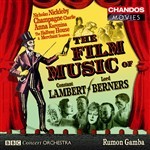
The Film Music of (Incls 'Anna Karenina' & 'Nicholas Nickelby')
 $40.00
Low Stock
add to cart
$40.00
Low Stock
add to cart
CONSTANT LAMBERT / LORD BERNERS
The Film Music of (Incls 'Anna Karenina' & 'Nicholas Nickelby')
BBC Concert Orchestra / Rumon Gamba (with Mary Carewe, soprano)
[ Chandos Movies / CD ]
Release Date: Friday 30 May 2008
Should this item be out of stock at the time of your order, we would expect to be able to supply it to you within 2 - 5 business days.
"Gamba and the BBC Philharmonic deliver for these few Constant Lambert and Lord Berners scores one of the best albums in the Chandos Film Music series."
(MusicWeb June 2008)
'Chandos have been doing great things in the film score re-recording world over recent years, especially in the case of British composers of the Golden Age. This Chandos CD is for me the crowning achievement so far of what was already an impressive addition to the Golden Age film music and one can only hope that Gamba and his forces will be able to record more before too long', wrote Music from the Movies on The Sea Wolf, the last release on Chandos Movies. Rumon Gamba and the BBC Concert Orchestra now present the first composer pair in Chandos' film music series, and the 'tandem' is no accident. There is the obvious link that the two composers were close friends, both musically and socially. But more to the point, the output of each in the field was limited, Lambert scoring only one documentary and one feature film, Lord Berners two complete features while contributing a song and dance to another. This output is here conveniently represented on a single well-filled disc.
Each composed in his own distinctive style, with a cosmopolitan rather than purely English accent. As a young man, Lambert developed interests in French and Russian music; in fact, three years after winning a scholarship to the Royal College of Music he was collaborating with the great Russian impresario Diaghilev on the ballet Romeo and Juliet - the only other British composer to receive a commission from Diaghilev was Lord Berners! Lambert would go on to become musical director and conductor of the Sadler's Wells Ballet. With this background he was an obvious choice to score the film of Tolstoy's Anna Karenina (1945) whose cast included Vivien Leigh and Ralph Richardson, with designs by Cecil Beaton. Dances by Glinka are woven into the ball scenes but elsewhere Lambert relies very much on his own voice, using a generous range of instruments including triple woodwind, four trumpets and trombones, and two harps. In the score for Lambert's earlier Merchant Seamen (1940) one detects the influence of Stravinsky's Pulcinella.
Lord Berners deserves his reputation as a versatile eccentric. Having worked as a diplomat, serving as honorary attaché in Constantinople and later in Rome, he returned to England on his succeeding to his title, and lived the rest of his life ostensibly as a country gentleman. Here was a composer whose music drew the highest praise from Stravinsky, and the consistently sharp focus of his small musical output ensures his survival as a unique figure in British music of the period. The three film scores featured here constitute some of the last music he was to write. Champagne Charlie (1944), starring Stanley Holloway, Tommy Trinder and Betty Warren, is a lively recreation of the bawdy music halls. The film is famous for the song 'Come on Algernon', praised as a hysterically realistic music hall number. Mary Carewe here brings it to disc for the first time in orchestral form. The Halfway House (also 1944) was Ealing Studio's first foray into the occult. The score is quintessential Berners, very much of a piece with his concert and ballet music. Of the Suite from Nicholas Nickleby (1947) Philip Lane writes, 'the music flits from scene to scene and character to character in a seamless stream of fertile invention'. This latest release in the film music series is sure to attract fans of both the films and their magical scores.
Tracks:
Constant Lambert (1905-1951)
Suite from 'Merchant Seamen' (1940)
Suite from 'Anna Karenina' (1948)
Lord Berners (1883-1950)
From 'Champagne Charlie' (1944)
Suite from 'Nicholas Nickelby' (1947)
Suite from 'The Halfway House' (1944)



